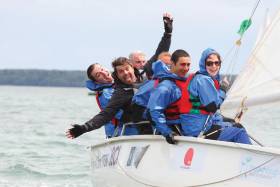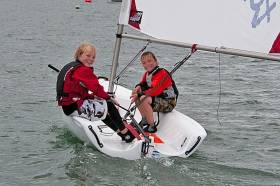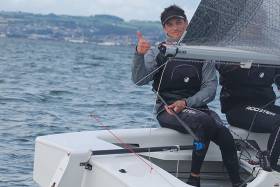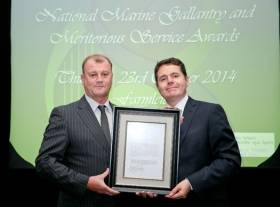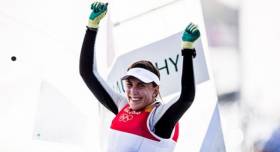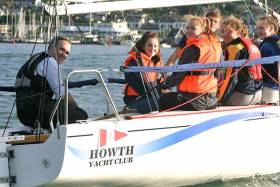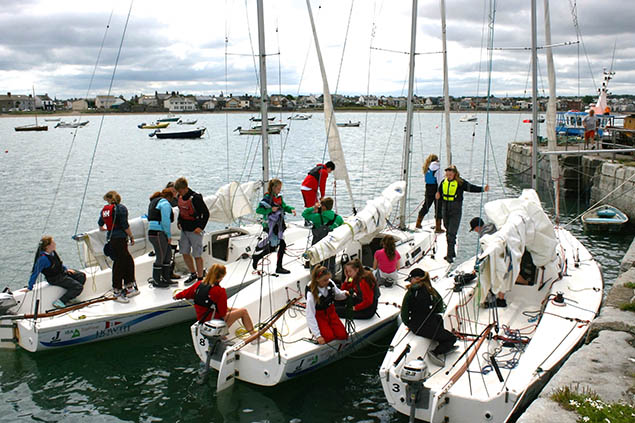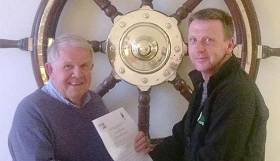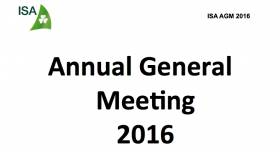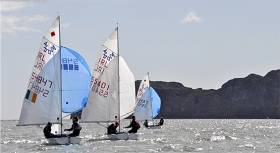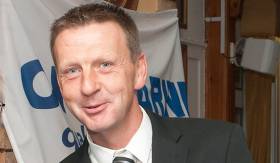Displaying items by tag: ISA
Try Sailing - Here, There, Everywhere
Looking back over the past season, two things stand out for me – the success of our Olympic sailors and the ISA’s Try Sailing initiative. Our Olympic sailors gave us marvellous inspiration this summer and showed our young sailors what can be achieved if you follow your dream and no doubt encouraged many newcomers to discover the thrill of sailing for the first time. My next blog will focus on our Olympians but, for the moment, I want to reflect on the success of the ISA Try Sailing initiative over the past season. 66 ISA clubs and centres throughout the country created new opportunities for local communities to come along and Try Sailing and, as a result, over 3,600 people tried sailing. A great achievement.
If you are not from a sailing background it can be hard to know where and how to start, and buying a boat before you have given it a try is a tall order. The simple message of “Try Sailing” is to help promote the idea that people can do just that – give Sailing a Try.
At those 66 venues there were open days, competitions, crewing initiatives, tasters, corporate programmes, Women on the Water events, Surf ‘n’ Turf days, cruises, Sailability events, kids’ clubs, bring a friend and more. It was wonderful to see each organisation running events and programmes to suit their own facilities and local community. Below I have set out just a few examples of the dedicated effort and creative activities of a handful of the clubs in 2016.
Try Sailing 2016 kicked off with an open day at Kinsale Yacht Club for local school children and an introduction to the Sailability opportunities for all physical abilities at the club. It was a blustery day and the strong team of volunteers adapted the activities for everyone with cruiser sailing, Sailability Squib sailing and rigging games. The club followed up with a series of coaching days for the young sailors throughout the season and successfully saw an increase in club training and membership.
Just around the corner, Royal Cork Yacht Club had a particularly busy year under the Try Sailing banner. Colin Morehead, Try Sailing ambassador at Royal Cork and ISA policy group member, says they have had their busiest year yet. Their Try Sailing all started in May with the annual 6-week introduction to youth sailing programme with 80+ children participating.
The club then organised an 8-week training programme with 45 sailors from a large Cork based company, Voxpro, and developed a winning team to race in the Non-Spinnaker Class of Volvo Cork Week. It was particularly satisfying to see complete novices grow into sailors capable of successfully racing a 1720 sports boat in such a short time.
Combined with a highly successful Open Day in June, a very popular Women on the Water programme and Try Sailing sessions for adults, Royal Cork Yacht Club opened the doors to over 250 new Try Sailors.
Meanwhile over on the West coast, Foynes Yacht Club went for a gentle approach to attract new crews for cruiser racing. Club members brought newcomers out on the water to simply observe the racing and gain a basic understanding of what all the activity was about. This soft approach worked well in giving newcomers confidence to get on board and participate in cruiser racing. The ICRA ‘Crew Point’ initiative launched this year will continue to help to create many more new crewing opportunities throughout the country.
Foynes Yacht Club Junior Organiser Elaine O’Mahoney was delighted with the turn out when they linked up with the local youth clubs and transition year students for Try Sailing. Elaine tells me that a dedicated time slot for visitors to come and try, helped locals to make sailing part of their weekly routine. Overall, Foynes Yacht Club registered over 200 Try Sailors and are pleased to see the number of new members, sailing academy trainees and racing crews increasing.
Dingle Sailing Club introduced a clever “Bring a Friend” programme and doubled their participation numbers. Training Manager Feidhlim OBriain says he saw immediate results from their initial Try Sailing open day and then continued to use the Try Sailing branding to promote a series of Try opportunities, bringing a total of over 170 Try Sailors onto the water.
Galway Bay Sailing Club launched Try Sailing with an early season open day and saw an immediate impact on courses and membership for dinghy and cruiser sailors. They followed their open day with a 5 week Try Sailing coaching programme for adults, which then grew into a series of start sailing adult courses. 152 Try Sailors brought an increase in membership, training and crewing. The club are now making plans for a new ‘Women on the Water’ programme for 2017.
Clontarf Yacht and Boat Club’s ‘Sail Against Suicide’ provided a chance to Try Sailing with a typical Clontarf welcome in the clubhouse afterwards. Combined with earlier corporate and public events Clontarf registered 98 Try Sailors in dinghies and cruisers and have big plans for 2017.
Overall, the message of Try Sailing is helping to open the doors, hatches and pontoons to more newcomers to our wonderful sport. So, next time you are getting on board, remember “Bring a Friend” and give them the chance to “Try Sailing”.
Our Regional Development Officers look forward to helping your club implement its Try Sailing plans and together we can grow the number of people enjoying the delights of sailing.
Happy Christmas and safe sailing in 2017.
Places Available For 2017 ISA Sailing Courses At Baltimore SC
#TrySailing - Baltimore Sailing Club is now taking bookings for places on its 2017 ISA summer sailing courses.
The first course runs over three weeks from Monday 3 to Friday 21 July, while a second three-week course runs the following month from Tuesday 8 to Friday 25 August.
In addition, a Junior Try Sailing Taster Course runs from Monday 24 to Friday 28 July comprising two half-day courses each day.
Application forms are available on the Baltimore SC website HERE.
GP14 Champions Decline ISA All Ireland Sailing Competition Invitation Over Entry Fee Expense
Two invitees have declined their invitations to this weekend's Irish Sailing Association (ISA) All Ireland sailing competition at Royal Cork Yacht Club over an entry fee that the ISA says it is forced to charge in the absence of an event sponsor.
GP14 World Champion Shane MacCarthy says the 'entry fee is too expensive and not in line with dinghy entry fees'.
Fellow GP14 helmsman Hugh Gill goes further and says the €220 charge is 'an indication of how the ISA is out of touch with how the majority of sailors manage their participation in the sport'.
Neither sailor is attending the Crosshaven event that is to be sailed in National 18 dinghies.
16 sailors, including Rio Olympic silver medalist Annalise Murphy, have been invited to attend the annual end–of–season event organised by the national governing body.
Sutton Dinghy Club's Gill wrote to Afloat to say he had declined the invitation due to the insistence by the ISA that all entrants, despite being invited to participate, must pay an entry fee of €220. Gill says' Other participants have entered but have sent correspondence expressing their disappointment regarding the entry fee'. He adds: 'The imposition of an entry fee is a recent change, maybe for the past 5 years, to what was always an invitational event attended by various Class National Champions and other sailors who had achieved success on the international stage. To impose any fee on this event let alone a charge of €220 for an event comprising a number of short races over two days for 16 invited sailors is another indication of how the ISA has lost touch with the reality of how the majority of sailors manage their participation in the sport'.
In response, ISA Chief Executive Harry Hermon has described the withdrawal of both GP14 helmsmen as 'most unfortunate'.
In a statement the ISA says: 'the background to the current situation is that up until 2008, the event was sponsored which enabled the host club to run it without an entry fee. Since that date there has been an entry fee paid to the host club, with the average being in the range of €120 - €150. Last year’s event had an entry fee of €130.
Each year, as part of a review following the event, we ask sailors how it can be improved. These questions produce mostly expected answers, namely dinghy sailors prefer the event to be in dinghies, while keelboat sailors prefer keelboats! In recent years the event has been run in J80 Keelboats, and this year we are delighted to be able to return to dinghies using the National 18’s thanks to the generosity of the National 18 Class in loaning their boats.
Last year, the feedback highlighted the fact, that while the on-the-water format was good, the social side was totally lacking, with a very low turnout for the Championship dinner. In fact, many of the sailors indicated in advance that they would be attending, but on the night very few appeared. This left the host club with a lot of uneaten food and a significant loss on the night. This year in response to the feedback received from the competitors, the ISA decided to try to make it a more sociable event and to promote the dinner as something worth attending, hence the cost of the dinner is included in the entry fee. The fee of €220, is made up of three dinners at €30 each and entry fee of €130, the same as last year. As all event organisers will concur, the costs associated with staging an event with only 16 entrants do not differ significantly from staging a larger event with more competitors enabling lower entry fees. It is also worth noting that the ISA sets the entry fee, but does not get any of the funds generated through the staging of the event.
All the other nominees accepted the nomination and the entry fee of €220. The two competitors who were subsequently invited to take up the slots made available by Shane and Hugh were delighted to accept. It is regrettable that two sailors, who should be sailing in the event have declined their invitation, however in the absence of a sponsor, we do not believe it is unreasonable to ask the competitors to pay for the costs associated with staging the event, and buying dinner for the person lending them their boat.
At this late stage it is not possible to change the format or pricing structure for the event, however the ISA will initiate a detailed review of the event following this year’s championship, and in the improving financial environment specific efforts will be made to attract a sponsor for future championships.
In closing I'd like to express our gratitude to Royal Cork Yacht Club for hosting the event and to thank the members of the National 18 class for facilitating this event by lending their boats, their generosity is acknowledged.
We wish all the contestants every success and hope that all the participants have a truly enjoyable event and a sociable evening' – Harry Hermon, ISA.
Nominations Sought for National Marine Gallantry & Meritorious Service Awards 2016
Department of Transport, Tourism & Sport is inviting nominations in respect of the National Marine Gallantry and Meritorious Service Awards 2016. The purpose of this awards scheme is to recognise outstanding acts of courage, heroism, skill and initiative in the context of marine emergency incidents. The scheme also recognises exceptional dedication to duty in the execution of Ireland’s marine emergency response. The Marine Gallantry award is presented in the form of a medal (called the Michael Heffernan Medal for Marine Gallantry, in memory of an individual who lost his life during a marine incident a number of years ago). Three levels of medal may be awarded, based on the level of gallantry involved. The medal is awarded in gold, silver or bronze.
A second award, Marine Meritorious Service Medal, may be awarded where outstanding meritorious service has been provided to, or within the remit of, the Irish Coast Guard. The person must have demonstrated exceptional dedication to duty, coupled with skill and initiative, in the execution of the service being provided.
A Marine Ministerial Letter of Appreciation may be awarded for meritorious service where outstanding dedication to duty over a career of service can be demonstrated, or for an act of particular meritorious dedication, showing skill and initiative, but which is not of an order for receipt of a Meritorious Service Medal.
The National Marine Gallantry and Meritorious Service Awards Committee is chaired by Mr Bryan Dobson of RTE. Members of the Committee include representatives of the following, the Irish Sailing Association, Irish Water Safety, Irish Harbour Masters Association, Bord Iascaigh Mhara, Department of Transport, Tourism and Sport as well as other independent members. The National Marine Gallantry and Meritorious Awards Committee will adjudicate upon the nomination received.
The first award ceremony took place in February 1999 and the awards ceremony was last held on 23rd October 2014. In this round of Awards, nominations may be considered in respect of events occurring during the period 31st August 2014 to 31st August 2016.
Details of the Awards scheme, including nomination form, are available on the Department’s website www.dttas.ie/maritime/english/marine-awards. Completed nomination forms should be submitted by Friday 9th September 2016. The submission should be comprehensive and include all relevant information (e.g. eye-witness statements, official reports, maps, charts, photographs, newspaper cuttings etc.).
2014 Award Recipients
Mr Tony McNamara and Mr. Patrick McNamara - Marine Ministerial Letters of Appreciation for Meritorious Service
Mr Ben Graham, Mr David Grant and Mr. Alexander May - Marine Ministerial Letter of Appreciation for Meritorious Service
Drogheda Coast Guard Unit - Marine Ministerial Letter of Appreciation for Meritorious Service
Mr Michael O’Regan and the crew of the Goleen Coast Guard Unit - Marine Ministerial Letter of Appreciation for Meritorious Service
Mr Jim Griffin – Marine Ministerial Letter of Appreciation for Meritorious Service
Mr Damien Dempsey – Marine Ministerial Letter of Appreciation for Meritorious Service
Mulroy Coast Guard Unit – Michael Heffernan Bronze Medal for Marine Gallantry
Murphy's Victory Boosting The Profile Of Irish Sailing Says ISA Performance Chief
#ISA - Annalise Murphy's success in Rio is bringing the sport of sailing to "a much wider platform", according to the Irish Sailing Association's performance director.
Speaking to Bobby Kerr on Newstalk's Down to Business yesterday morning (Saturday 3 September), James O'Callaghan remarked on the sheer number of people of all ages who turned out for the Laser Radial silver medallist's homecoming in Dun Laoghaire.
"That's the first big change: all of a sudden we have a sports star," he said of Murphy, who was a guest on Friday's Late Late Show.
But beyond the media profile was talk of the business of getting her to sailing's elite level – thanks in great part to investment from Sport Ireland, investment that's focused on the sailing classes where Ireland can be most competitive.
O'Callaghan said taxpayer support is "exactly what's needed for Ireland to succeed on the international stage. But it's limited; the sport budget hasn't grown in the last four years."
As a result, private sponsorship – both of the ISA's programmes and individual sailors – remains a linchpin of the sport's funding, while the new Irish Sailing Foundation aims to attract the backing of philanthropists with a passion for Irish sporting success.
Listen to the whole interview below:
Brexit Bonus Helps Howth Yacht Club With New Keelboat Training Fleet
While the headlines and public attention for much of the summer were dominated by the acrimonious Brexit vote in Britain and the extremes of the Olympic Games in Rio de Janeiro, out beyond a narrow sandspit on a secretive peninsula east of Ireland, a special project was being finalised. This has seen the local sailing club benefit both from the Brexit fallout, and the general increased goodwill towards sailing in Ireland which Olympic success has generated. W M Nixon finds that his home-from-home of Howth Yacht Club has been doing some remarkable things while everyone else – himself included - was looking elsewhere.
You’ve heard the story about the three Howthmen who went across to England a few weeks ago to buy four J/80s, and came back with five? We hadn’t either. But all we know is that every time recently when we looked along the hard-standing on the waterfront at Howth Yacht Club, there seemed to be a couple of extra J/80s about the place. Soon there were five. And they all looked distinctly newer than the eight long-used J/80s of the SailFleet flotilla of the ISA, four of which are regularly stored out the back of the Howth club when they’re not in action.
All was revealed last weekend. The background is that Howth YC had undertaken to look after the ISA’s SailFleet flotilla of eight J/80s when the national authority began its severe slimming process three years ago. The club uses four of them at any one time in a leasing programme from the ISA for its own training purposes, but rotates the boats for their periods of non-use to implement an “equalisation process”. And of course, all eight are made available for the use of the ISA in national events like the Helmsmans Championship, wherever such events may be held.
However, since 2013 when Breda Dillon was Commodore, the Howth club has also had in place the allocation of a Sports Council capital grant for buying keelboats for training, the grant of €77,000 being conditional on HYC raising an extra €23,000 to provide a round sum of €100,000.
It was also conditional on being spent before 31st July 2016. Logic would seem to suggest that they would buy the ISA boats, four of which were on lease until 31st December 2016 anyway. But it wasn’t as simple as that. Those boats were bought with a government grant in the first place. There were all sorts of potential problems with VAT and whatever. And a bidding war against other clubs was an additional unknowable.
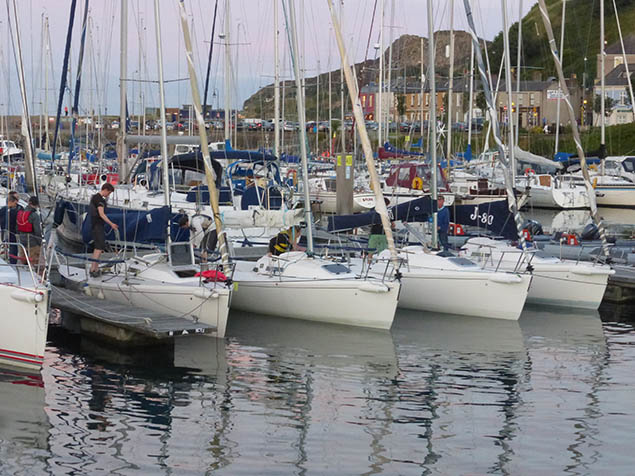
Yet the Howth men knew that for a multi-purpose boat which can play a key role in getting new people into sailing, or encouraging lapsed sailors back again, the J/80 was and is and will long continue to be the best boat for the job. It’s one of the very few sportsboat types which qualify for a European offshore certificate. And it is also entitled to an IRC rating. Thus in the Irish context, you can race it as a One-Design, but you are also eligible for open ICRA competition.
In addition to that, the J/80 is a very likeable knockabout boat, real fun to sail with a cockpit big enough to take significant numbers of beginners out for good yet educational times afloat, while still being a very serious racing proposition for crews of three to five. Thus the feeling in Howth was that increasing the national stock of J/80s by whatever means would be good for Irish sailing anyway.
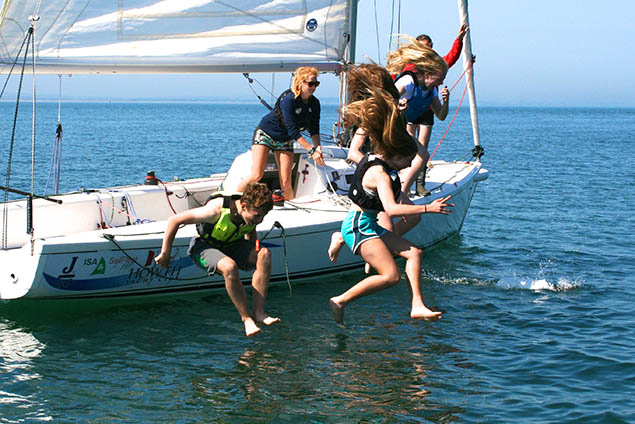 While the J/80 was designed primarily as a performance boat with racing a priority, in Howth they find many other uses. Photo: Brian McDowell
While the J/80 was designed primarily as a performance boat with racing a priority, in Howth they find many other uses. Photo: Brian McDowell
But though the J/80 has been a major part of the sailing scene in Europe only since a new production facility for the boat was set up in France in 2002, the design actually first appeared in America in 1992. And with the remorseless new product initiative which drives J Boats as it drives any other successful company, in late 2012 J Boats introduced the J/70, more of an outright sportsboat than the J/80, but still with a little cabin – albeit a much smaller one.
Thus for those with a taste for novelty and fashion trends, the J/70 will have been seen as the successor to the J 80. But many would reckon that the J 80 continues to be a significant brand in her own right, as she has that cherished European offshore cert. And while her cabin is minimal, it does offer significantly roomier overnight space than the J/70, as the J/80 is almost 9% larger in every way than the newer boat, an addition in size which adds a very useful bit of beef to her potential for multi-purpose functions.
That said, in the last couple of years the advent of the J/70 has tended to freeze or even reduce the price of used J/80s. For the Howthmen sitting on a war chest of €100,000 which had to be spent before the end of July 2016, the availability of top-quality used J/80s in the Solent area presented something of a dilemma. They could either enter into a lengthy tender process to take over the ISA J/80s, or else they could send an expeditionary force to the south of England to snap up four quality J/80s in a neat and clinical operation.
Four was the key number, as experience in the past three years has shown HYC that the total SailFleet flotilla of eight boats is too much for one club to handle comfortably, but anything less than four boats would be less than the required critical mass. Four boats was the absolute minimum, but as Howth YC also have two J/24s in their successful U25 Keelboat Training Squad, including the Enda O Coineen-donated Ireland’s Eye Kilcullen (Ireland’s Eye are knitwear manufacturers in nearby Baldoyle), they had some flexibility of movement in finalizing boat numbers.
In fact, in recent years the Howth club has become so dedicated to introducing people to sailing and training generally that the noted offshore racer Kieran Jameson, a General Committee member who heads the HYC key “Vessels Committee”, finds his group running a club-owned training fleet of thirty dinghies including Optimists, Toppers, 420s, and Laser Vagos. But in addition to dinghies, the Howth sailors are very strongly of the opinion that keelboats also have an important role to play in getting people started sailing, thus at any one time the club has had six “training keelboats” – the four J/80s being used at any one time plus the hotly-competed pair of J/24s – playing an active role.
The feedback from HYC Marine Manager Brian McDowell during the 2016 season has been particularly encouraging regarding the popularity of the J/80s as much for non-racing activity as for racing/training. Ireland’s many cruising enthusiasts will be delighted to hear that day cruises to places as diverse as Skerries, Dalkey Island, and Dun Laoghaire rating high on the list of favourite activities aboard J/80s amongst both younger and adult newcomers to sailing alike.
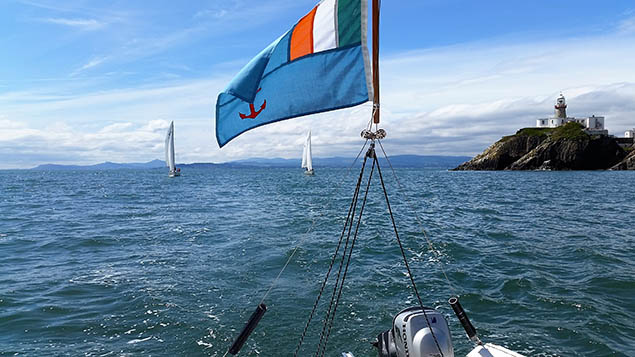 Cruising enthusiasts will be pleased to hear that trainee sailors at Howth particularly enjoy using the J/80s for cruises-in-company along the local coast. The photo above shows them returning round the Baily after a visit to Dalkey Island and Dun Laoghaire, while (below) one of the most popular destinations has been Skerries, which involves a 14 miles coastal passage with proper navigation and pilotage exercises. Photos Brian McDowell
Cruising enthusiasts will be pleased to hear that trainee sailors at Howth particularly enjoy using the J/80s for cruises-in-company along the local coast. The photo above shows them returning round the Baily after a visit to Dalkey Island and Dun Laoghaire, while (below) one of the most popular destinations has been Skerries, which involves a 14 miles coastal passage with proper navigation and pilotage exercises. Photos Brian McDowell
So acquiring the best possible J/80s within the budget was clearly the way to go. After Vice Commodore Emmet Dalton had burnt the midnight oil and the fibre optic cables in ensuring that everything in the original capital equipment grant application of 2013 was still valid, Commodore Berchmans Gannon and his committee confirmed Kieran James as “Concept and Logistics Director” with his three man “Solent Procurement Task Force”, and off they went with the 31st July deadline looming.
All this may sound very formalised, but as anyone who is familiar with Howth will know, there are times when you’ll find yourself in the midst of what seems to be a convivial gathering, yet it’s actually an open-ended official planning meeting. The club takes much of its internal communication style from its oldest class, the Howth 17s of 1898, which have managed to stay together for 117 years while apparently relying largely on telepathy for in-class information. And as all the many people involved in the J/80 acquisition programme were old friends who frequently sail together as shipmates, new ideas and understandings of how best the project might best move forward could emerge in all the most unlikely places at unexpected times.
The three man squad was imbued with enthusiasm, as Kieran Jameson is a total J/80 fan. So he already had the class’s used-boat scene sussed out in some detail in the south of England where he is well known, and with him he brought his keen sub-committee member Johnny Wormald, while third hand was a very important man when money is being spent, HYC Honorary Treasurer David Sargent.
They’d two very busy days around the Solent finalizing deals on four J/80s of the required standard in a time of financial turbulence. After the Brexit vote, the Pound Sterling had plummeted against the Euro, but their feeling (quite rightly as it turned out) was that even though it was still falling, it might be about to bounce back a bit any time soon, so there was some urgency to their work.
With no slackening of the pace, the buying job was done, and then with four boats satisfactorily secured, they were having a celebratory lunch in the RORC’s Royal Corinthian clubhouse in Cowes. But David Sargent couldn’t stop being the money man. He’d been working the screen for the numbers and the exchange rate, and in mid-meal he came up with the news that they’d hit the dealing floor on the sweet spot, in fact if they wished there was still enough in the kitty to buy a fifth boat.
Well, why not? A quick phone call home got the cheerful instruction to go right ahead. And another quick phone call ensured the fifth boat was theirs before news had spread from the Isle of Wight that three mad Irishmen were on the prowl around the Solent ready to throw good money at proper quality used J/80s.
Moving up to five boats from four may not seem such a big deal. But in fact it puts you across a significant threshold as many clubs such as Dublin Bay SC will recognize five boats as a valid class eligible for its own start, but not four. Yet thanks to Brexit, as former HYC Commodore Brian Turvey has since put it: “We landed sunny side up” – five boats and all of them good ones.
But now the challenge was to keep things moving along. Everyone had been fuelled with the excitement of the chase. Yet with high summer and its holiday plans upon them, a busy sailing programme in full swing, and the all-dominant Olympics taking over all sailing thinking for two weeks in mid-August, the challenge for all involved was to get the five boats safely back to Howth and moved into the next stage of the plan, for it was essential that the boats be in active use as soon as possible.
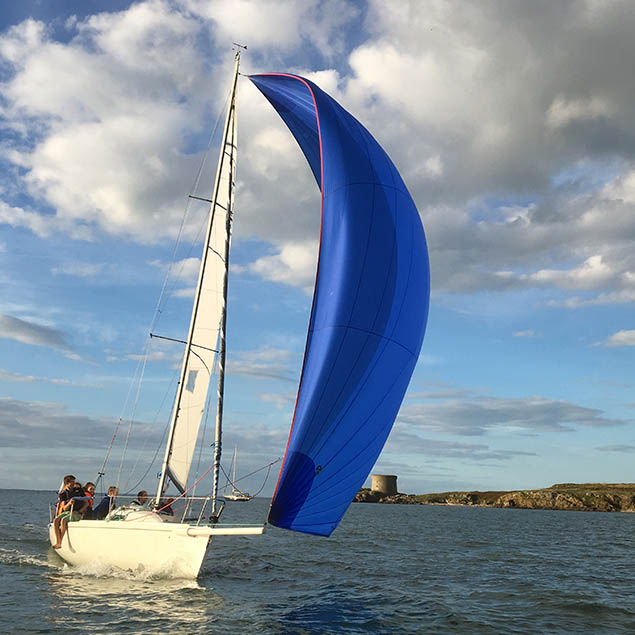
Thanks to the usual useful contacts, the boats were road-trailed to Fishguard and popped on the ferry to be taken across channel on their own to Rosslare. There, another key contact made sure they were taken safely off the ship and put in secure storage while a volunteer towing team co-ordinated by Ian Malcolm journeyed up and down the M11 from Howth until all the boats were safely on the peninsula to successfully complete a project in a league of its own for sheer value for money.
Which is fine and dandy, but the boats need to be used, and used for a lot for multiple purposes, to make this extraordinary example of club and voluntary effort worthwhile, and worthy too of the Sports Council’s support. Yet by now total serendipity had set in. Even as the newly-acquired boats were being checked over and rigged by the flotilla’s newly-appointed bo’sun Luke Malcolm, the news from the Olympic sailing in Rio got better and better. Suddenly thanks to Annalise Murphy and her team-mates, the sun was shining on Irish sailing, and there was no better time to be launching a new initiative in sailing promotion. While there’d been some concern that moving up to five boats from the projected four was maybe a bit ambitious, now people were wondering would five boats be enough.
The day after the fantastic Annalise Murphy “Welcome Home” night at the National Yacht Club, across Dublin Bay on Friday August 26th, beyond the Baily Lighthouse round in Howth Harbour the new five-strong flotilla of Howth YC’s own J/80s were in final preparation for their introduction to the membership and public with an Open Evening providing many immediate options for sailing aboard the boats. It was primarily designed with the club’s rapidly growing beginner and junior sections in mind, and as one of those perfect evenings which have blessed the late summer, it showed how well the performance-oriented J/80s lend themselves to simply being used as fun boats which can maximise the numbers getting afloat for straightforward sailing pleasure.
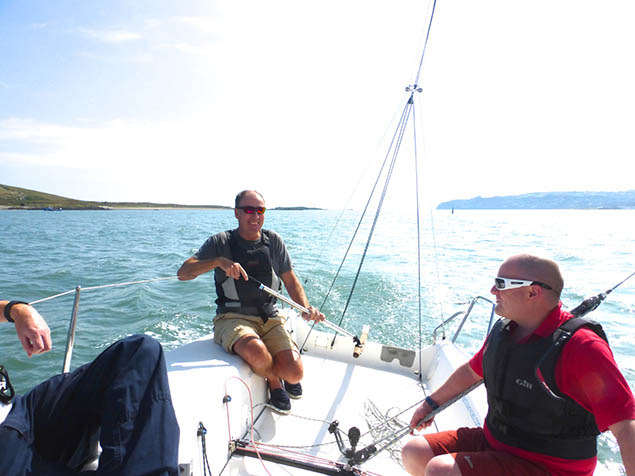
It also underlined the fact that at Howth as at other clubs, people such as Kieran Jameson and noted instructor Graeme Grant share the concern of leading thinkers in other clubs, that it has been too easy to let junior training and coaching take the more easily-managed route of single-handed sailing. Thus Howth has become a centre of 420 encouragement in the hope of leading on to more advanced two-handed boats, and while the J/80s were making their debut with waves of youngsters on board, on the same waters the current World 420 Bronze Medallists Doug Elmes and Colin O’Sullivan were having their first forays with their newly-acquired 49er skiff, one of a new national wave of seven 49ers with crews drawn from a number of Irish sailing centres.
But primarily it was the J/80s’ evening, and they performed with style. With the weather co-operating, the programme moved jauntily on into a junior party with early supper in the club, and then finally, with a very informally-minded audience made up of every age and interest in Howth sailing, the plans for “our very own J/80s” were at last officially revealed by Commodore Berchmans Gannon and his team.
Noted offshore racing champion Ross McDonald, as Chairman of the HYC Performance Sub-committee, left us in no doubt that while the multi-functional uses of the J/80s are significant in the new flotilla’s programme, the boats’ performance potential is also another pillar of their activities, and they’re going to be very actively raced, with their first major series the up-coming Howth Autumn League. The possibilities of sending a boat or two to major J/80 championships in the future has not been overlooked, and of course next year’s ICRA Nats at Royal Cork Yacht Club from 9th to 11th June to will be another option thanks to those very useful IRC Certs.
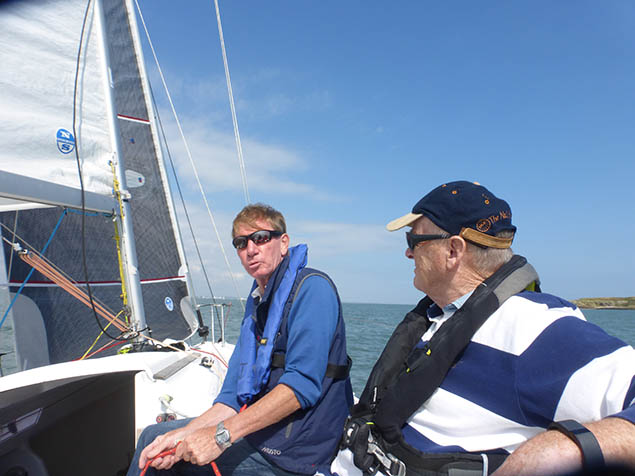
It seems an awful lot to be asking of a little fleet of five 26ft boats, but the best way to show me why it could all work very well indeed was to let me sail a J/80 on Sunday, when all was revealed. The secret of a J/80’s appeal seems to lie in the fact that she’s a boat of broad-spectrum performance and function aboard which kids feel like grown-ups, while a group of grown men start behaving like a pack of schoolboys having sailing fun.
My four ship-mates were at the heavy-hitter end of sailing’s local and national sailing administrations. They included former ICRA Commodore Nobby Reilly who has unrivalled experience in using the J/80s in Try Sailing events – he regularly gets turnouts of upwards of 80 total newbies at such happenings – there was also HYC Vice Commodore Emmet Dalton who somehow finds himself to be the owner of a foiling Moth and the skipper of a Howth 17, there was of course Kieran Jameson whose devotion to sailing and it development and promotion is lifelong, and there was also former HYC Commodore Brian Turvey who has been the club’s liaison man in handling relations with the ISA SailFleet administration while coming to the conclusion that the only way forward was for Howth to buy its own fleet of J/80s to give the programme an extra and vital element of direct proprietorial pride, something which has been achieved.
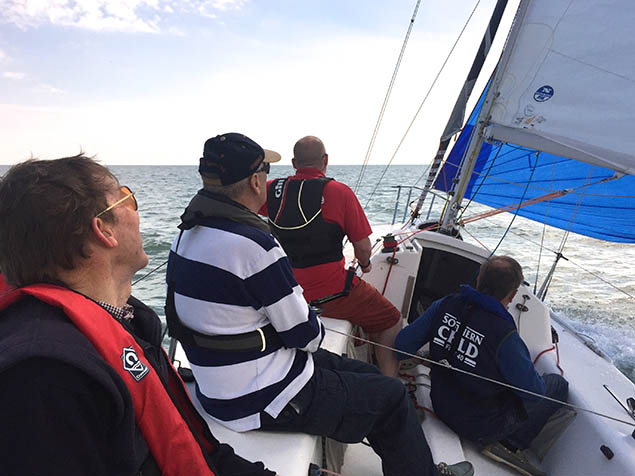
So in sailing “our” J/80 in a glorious burst of sunshine and a grand little north to nor’east breeze last Sunday while the HYC Junior Dinghy regatta with 90 boats in several classes proceeded apace nearby, and Doug Elmes and Colin O’Sullivan buzzed over the ocean towards the northern horizon in their 49er, we had ourselves a ball. While you can certainly get sensational speeds out of a J/80 when the breeze is stonking, we’d no bother in that pleasant moderate wind of finding 7.6 knots through the water with genniker set, and as that translated into 8.7 SOG thanks to a favourable tide, the schoolboy glee was much in evidence between sessions of serious information exchange about the importance of the boat in Howth’s development programe.
In such sailing conditions, the J/80’s effortless progress made it possible for us to get quicky up to Malahide and then have some sport carrying the genniker as close as it could go to get us round Ireand’s Eye where the gannets are more crowded than ever on the Stack, and back into Howth Marina with the J/80s manoeuvring capacities being demonstrated with a flourish.
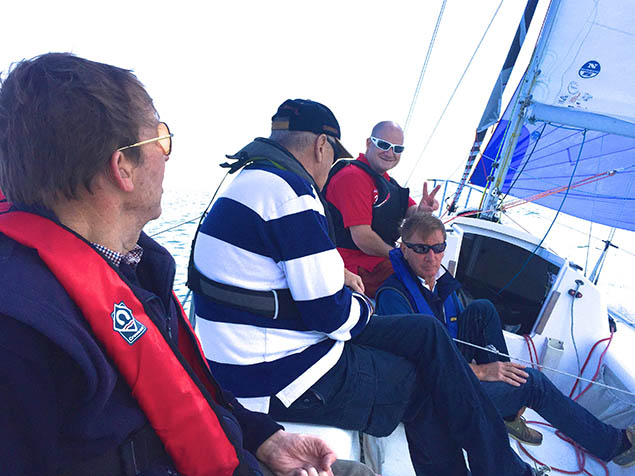
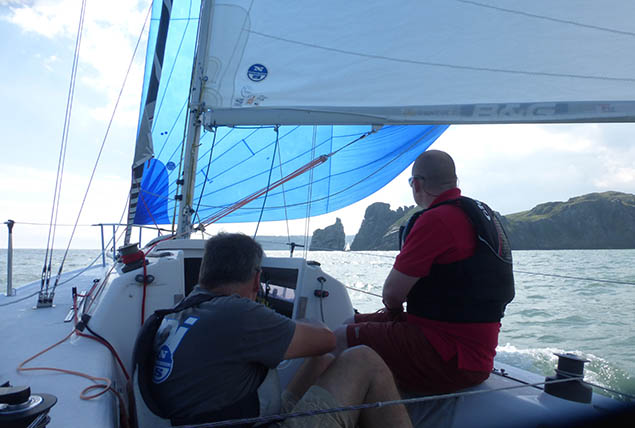
Of course, it won’t always be a sunny nor’easterly of very manageable strength, and it won’t always be a time when a club can look back on its own good season while sharing the national mood of euphoria over an Olympic Sailing Silver Medal. But this new J/80 project at Howth has a lot going for it. And when you start looking at the figures which would have come up if they’d ordered new boats, or maybe even new J/70s, through the formal channels, you’re very quickly getting away from €100,000 for five boats, and approaching the region of a quarter million euros.
But for the times that are in it, it seems that Howth took the best approach. In fact, when the boats are going to have such a multi-functional role, it’s surely better to start with the best second-hand boat available rather than a brand new one. When knockabout use is part of the programme, evidence of the occasional little scape or minor bump makes the boats seem less daunting.
So in all, it has been a very good six weeks of voluntary work. But out in Howth, they don’t see it that way. As far as they’re concerned, the work is only beginning. If those boats aren’t all being kept very busy, steps will be taken immediately to accelerate the pace.
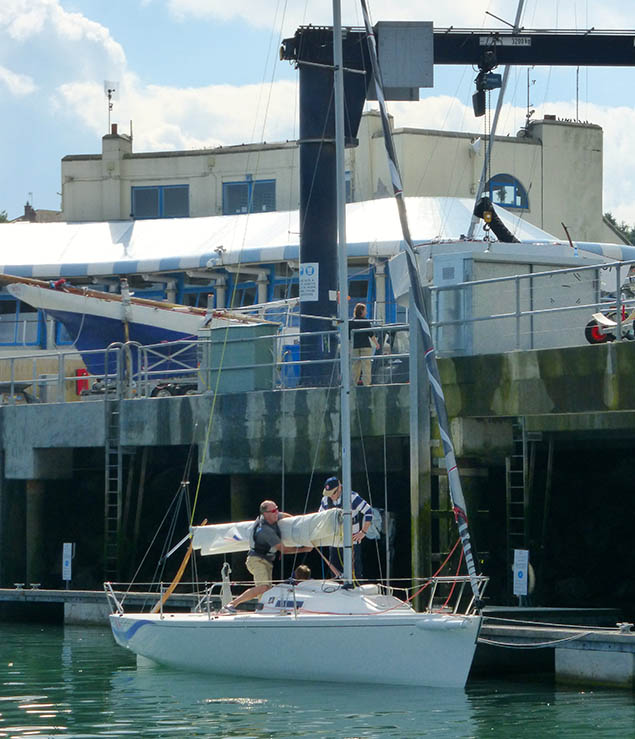 Home port, and everyone gives a hand. Former HYC Commodore Brian Turvey and former ICRA Commodore Nobby Reilly stow the J/80’s mainsail while above on the forecourt the presence of the 1898-built Howth 17 Rita is a reminder of HYC’s long and colourful history. Photo: W M Nixon
Home port, and everyone gives a hand. Former HYC Commodore Brian Turvey and former ICRA Commodore Nobby Reilly stow the J/80’s mainsail while above on the forecourt the presence of the 1898-built Howth 17 Rita is a reminder of HYC’s long and colourful history. Photo: W M Nixon
The Irish Cruiser Racing Association (ICRA) and the Irish Sailing Association (ISA) have signed a Memorandum of Understanding (MOU) for the two associations to work closely together to support cruiser racing efforts. Initiatives such as ICRA's crew training 'Crewpoint' resource will be developed further to help give crew and boats an easier path to matching up opportunities to race together.
Crewpoint will help to unite crew with skipper and boat, as well as create a greater awareness of access to sailing. For non boat owners ICRA, Crewpoint and the ISA are linking up with the Try Sailing campaign to create access points for more people to give sailing a try and to encourage more sailors to give racing a try in open days, crewing opportunities and events.
To help support the development of Cruiser Racing in Ireland all ECHO and IRC handicap fees are reinvested in the development of Cruiser Racing.
President's Report of the Irish Sailing Association AGM
Ladies and gentlemen welcome to the AGM of the Irish Sailing Association, now in its 70th year since its foundation in 1946, as the Irish Dinghy Racing Association. In 1946, when the sole requirement was to promote dinghy racing, little did our founding fathers realise what their brainchild would grow into. Today, it is the shear diversity of watersports in Ireland that is difficult to comprehend. Hardly a year goes by without some further extreme form of sailing being conceived and attracting its following. It is sometimes difficult for the Association to keep track of developments let alone find ways of representing them!
A quick look across the diversity of our sport gives some idea:
- Dinghy racing, covering the range from optimists to 49ers
- Keel boat racing from Squibs and Glens to top of the range Commodore Cuppers
- Cruising sailors, who by their very nature are lone sailors
- Surfboarders and Kiteboarders
- Power boating
- Add into that the administration of racing and handicaps, international representation, regulation and inspections, lobbying and complying with ever changing and evolving legislation, gives you some idea of the workload of the ISA.
Over the past two years, one thing that has struck me is the fact that each of these groupings is independent of the others and is really oblivious as to what the ISA is doing for the sport generally and for other groupings. This proves difficult, because into the mix you also have to add in the wide range of classes, clubs and training centres. So, if we have not implemented all the changes that your class, or club or training centre hopes for, please bear with us, we will get to you.
Having said that, we are making progress and 2015 has been another year of change and achievement. It must also be remembered that we are only in year one of a five year implementation plan as set out in the Strategic Plan, which was approved by last year’s AGM.
I, and indeed Irish sailing, is most fortunate in having a Board of dedicated Directors, who give tirelessly of their time:
Brian Craig: Training and Coaching
David O’Brien: Secretary
Paddy McGlade: Cruising and Risk and Governance
Sarah Byrne: Dinghy racing classes
Colm Barrington: Olympic Steering Group and High Performance
Robert Dix: Representation
Pierce Purcell: Access and Participation
Jack Roy: Racing
I would also like to thank Roger Bannon, our Treasurer for the past twenty months, who, due to pressure of work had to stand down a short while ago.
A quick review of the major achievements of the past year shows the following:
Dinghy Racing Classes:
One of the main objectives here has been to improve communications with the dinghy classes. However, there is still a lot more to be done in this area.
The Club Racing Classes survey, in addition to the communications issue, highlighted the large segmentation of dinghy classes, which, given the smallness of the Irish market, is a major issue
The Regional Development Officers have worked closely with clubs and classes to identify local Club ‘pathways’ that will build on local/regional penetration to improve competition.
The introduction of Dinghy Fest by Royal Cork Yacht Club was a very positive event and it is hoped that events of this nature will help promote dinghy sailing. The initiative has been taken up by Galway, who will run Dinghy West in 2016 and dates for Dinghy Fest 2017 are already under discussion. I would urge sailors to support this event and other such events where classes combine to run regional and national championships.
Looking to this year, there is a very extensive schedule of work planned:
- Consult with classes to examine fall out at youth level.
- Facilitate Event Calendar discussions with classes starting late August, November is too late.
- Renewed emphasis on promotion of double-handed dinghy sailing
- Carry out a junior and youth survey, with a target date of late April/early May. This will further inform on how the ISA as well as club and classes can formulate policy and initiatives to transition and retain more sailors into adulthood. It should be noted that while we have heard from parents and classes, we still have to hear from the youth themselves, this will be important as they are the lifeblood of our sport.
- The Racing Policy Competition Policy Group, as defined by the 2016 focus group, will be reformed to some extent to reflect representation from those who will deliver on the ongoing needs of the group as defined by the focus group and objectives reflected in the Strategic Plan.
- Promotion of third Level Sailing & Racing:
• Liaise with College Sports Administrations, we will look to provide support for organising events, event management, what is required, to run College Club and Intervarsity circuit successfully.
• Raise profile in the media, while this is up to college sailors themselves, we plan to give them guidance on how to proceed.
• Promote student transition and involvement in keelboat racing. Howth Yacht Club has been successful here with their K25 group. This concept to be explored and expanded where possible. Work with local clubs to identify opportunities to expand into keelboats on a more regular basis and build on the success in CIT and UCC last year with the 1720 event
• Club Pathway definition by Regional Development Officers to assist transition to ‘adult’ classes & encourage race formats for distinct groups of junior/learner racing to ensure:
i. Accessibility and sustainable participation at Club and local level.
ii. ICRA Crew Point initiative will assist in putting more keelboats on the water over time.
Two important issues which were raised in the Satisfaction survey with Classes are:
• Event management templates and documents to be developed for the ISA elibrary, which will be accessed through the website. These will be aimed at assisting classes, clubs and colleges to develop standard documents to maintain continuity when administration changes and give:
o Class specific event guidance to host Club and Race Officer
o Event management guidance documents and checklist
o Post event evaluation for clubs and debrief checklist for clubs and classes
o Classes coaching and clinic template guidelines
• Many clubs identified a gap between Try Sailing, formal courses and transition to racing for youth and adults alike across dinghies and keelboats. The policy group will work with Training Policy Group to build a simple, structured achievable learning program, with delivery by clubs, class sailors, instructors or coaches
Cruising Policy Group:
In promoting cruising, we have been very careful not to transgress into the domains of the Irish Cruising Club (ICC) and the Cruising Association of Ireland (CAI), both of whom represent cruising sailors. However, as there is a large group of cruising sailors who are members of the ISA, we felt that we had to actively support their activities.
The newly formed policy group decided to continue to develop some of the suggestions from 2014. The main one being, holding a Cruising Conference. The event went extremely well with good quality speakers, good range of topics and an oversubscribed attendance.
Naturally we have learnt from the event in terms of length of time speakers were given, need for fewer speakers, bigger venue etc. In the future, it is likely that there will be a half day conference in the odd years in the regions (Cork area 2017, Galway area 2019, for example) with a one day conference in the Dublin area on the even years. This ties in with RYANI on the odd years.
We joined the CoolRoute project to keep informed of their progress and to contribute where possible.
The group drafted and published Guidelines for running a Cruise in Company (1 day, weekend and weeklong cruises). They have also updated and added to the Cruise Routes around Ireland and plan to enhance these with better chartlets.
We continue to assist CAI and there have been discussions with their Commodore on activities they might consider to create more opportunities for CAI members to meet and interact.
Risk Management and Governance:
The Board re-drafted the Code of Conduct for ISA Directors from a Sport Ireland template.
We also have a new Risk Policy Procedure (with help from RYANI), and a new Risk Register.
During the year, in collaboration with Sport Ireland, the Board undertook a review of its workings and communications. This led to a detailed report being prepared by the Institute of Public Administration. This led to a document on the Roles and Responsibilities for ISA Directors and this is currently being studied by the Board to see how it can inform the work plans for 2016 and beyond.
Training – A Year of Transition:
2015 was a year of transition for ISA Training as the significant decline in activity and the reduced satisfaction, as recorded in the Strategic Review, in ‘the ISA training product’ necessitated the reorganisation of ISA Training in late 2014.
The Staff, Instructor Trainers and Training Policy Group had a busy 2015 bedding in the new structures put in place to improve the support to member clubs and centres; introducing changes to make Instructor qualifications more attractive and standards more consistent; while also planning some of the more fundamental changes for 2016.
Small Boat Sailing Scheme:
A number of changes were made following feedback on the Small Boat Sailing Scheme (SBSS):
The changes initiated for 2015 were:
• Instructor revalidation period extended from 3 to 5 years.
• Instructor Revalidation Courses reduced from a two-day into a one-day ‘practical skills’ course organised directly with training centres.
• VHF Licence no longer a mandatory prerequisite for dinghy instructor
• Outsourced the provision of Emergency Care course element at reduced cost to aspiring instructors
• Pre entry Course - theory elements put online by way of sample background papers.
• Instructor Pre entry and Revalidation Courses - developed an Explanatory Guide with the Instructor Trainers to ensure each element of the assessments are marked consistently across the Instructor Trainer panel.
Instructors:
The availability of qualified Instructors to clubs and centres remains a key area of attention. While progress was made in 2015 we continue to focus on improving the skills, the consistency in standards and the availability of Instructors and Senior Instructors. In this key area of ISA Training we:
• Certified 485 instructors (45% Increase on 2014)
• Certified 79 Senior Instructors (44% Increase on 2014)
• 68 Instructor Courses and 18 Revalidation Workshops run around the country (similar number to 2014).
• Developed a Senior Instructor assimilation programme to bring long time-lapsed senior instructors back into the fold.
• Partnered with clubs to run 5 Senior Instructor Courses to ensure adequate supply of courses in each region.
New Initiatives:
Last year was also spent planning for the more strategic changes and the piloting of some new initiatives. Thanks to the excellent support received from the Instructor Trainer Panel the considerable work involved has been completed to enable the roll out of a number of fundamental changes, for example:
• The top level SBSS has been revised and streamlined for 2016 with a view to increasing participation and then link with the new Coaching Programme which is under development.
• New Advanced Instructor Qualification is being introduced to reflect the SBSS Course changes.
• The importance of the logbook to be re-established through the introduction of an electronic logbook and Sailing Passport which was piloted last season.
But ISA Training is not only about the Small Boat Sailing Scheme.
On the Cruising side an expert group from the Cruiser Trainers following a consultation process made recommendations to the Training Policy Group on how the ISA and RYA could best work together to provide quality practical and shore based certification to our sailing and motor boat members. As a result, Irish centres providing ISA and RYA practical and shore based courses both now use, as a common standard, the RYA training materials and instructor training processes rather than both organisations resourcing dual systems.
A new Cruiser Working Group has recently been formed under the Training Policy Group to undertake a review of the existing schemes and the wider issues affecting Cruiser Training. We expect these findings and recommendations to be finalised before the year end.
International Accreditation:
Arrangements are underway to have the ISA Training Schemes formally accredited by World Sailing.
A Training Guide for Clubs to assist junior organisers and a Guide to ISA Junior and Youth Classes to help members decide what class best suited their needs were both published on line during the year.
Work is also ongoing on the Windsurfing side and a full review of the National Powerboat Scheme will be undertaken in 2016.
High Performance:
2015 has been a busy year for the High Performance area, especially with Rio on the horizon. In addition, there have been a number of other notable achievements:
• More than 100 young people participating in the High Performance pathway programmes, from all over the country.
• Break-through year for the 420 Academy with our best ever results at Kiel (3rd and 5th) followed up by Douglas Elmes’ and Colin O’Sullivan's Bronze medal at the ISAF Youth Worlds in December.
• Stunning success of youth sailors over the summer, multiple top 10 positions, including Ewan McMahon's Silver at the U17 Laser Radial Europeans and Bronze at the U17 Laser Radial Worlds .
• Inaugural 49er Development squad set up and two teams competed at the Junior Worlds.
• Ryan Seaton and Matt McGovern's 49er Medal Race Finalists at Olympic Test Event and Gold Medal at the recent Princess Sofia 49er Olympic Qualifying Regatta
• Four teams qualified for Rio Olympics: 49er, 49erFX, Laser and Laser Radial. Trials for Laser and Laser Radial places ongoing.
• Successful re-negotiation of carding criteria with Sport Ireland to include results from Under21 championships, ensuring smoother transition from youth to senior
• Confirmation of sponsorship from Providence, GUL and High 5 Nutrition.
• Formation of Irish Sailing Foundation with initial seed capital from Sport Ireland and a private donation enabling the appointment of Jack Gleeson as Foundation Director.
Access and Participation:
2015 saw a new concept and new branding of "TRY SAILING", with banners and flags containing youthful colours and fonts, this has created a strong brand helping to promote the Association’s initiative in attracting new interest in trying sailing, joining clubs and completing courses. It is a warm and welcoming brand receiving a very encouraging response by all establishments in its first year. Over 3,000 people participated in events nationwide in 2015.
This was achieved with a very small budget, and as a result of the initial success, the ISA is increasing the funding considerably for 2016. We are pleased to announce The Marine Institute have agreed to support our campaign for 2016, promoting the sea and its environment.
Full details of the 2016 programme are contained in the appendix to this document.
In addition, we are delighted to be linking up with ICRA’s Crew point initiative, which together, with Try Sailing will provide a complete range of activities from children’s programmes to crewing on cruisers for the more mature person.
However, the ISA can only drive the concept so far and it’s then up to clubs and training centre’s to work with the numbers participating in the various activities and put in place attractive packages to make joining a club or taking a sailing course attractive
Early events will be kicking off with:
• Royal Cork Yacht Club on the 23rd April in Crosshaven,
• DunLaoghaire at the Royal St. George Yacht Club on Sunday 24thApril
• The Irish National Sailing Centre on 15th May
• Galway on 23rd May
Representation Policy Group:
The group’s primary aims for 2015 were to:
• Represent the interests of Irish sailors in respect of statutory affaires and legislation
• Identify strategy for the ISA’s representation on the various committees of ISAF, now World Sailing for the period 2016-2020
• Develop a strategy to effect change in the way Government and state agencies view sailing and lobby to promote safe & responsible participation
Effecting change within the statutory agencies through lobbying is by its nature a slow process and a number of issues are currently under discussion with the relevant departments, for example:
Small Craft Register:
Since the Department of Transport’s request for the ISA to withdraw the ISA’s Small Craft Register on the grounds that it was being used illegally, the ISA has continued its discussions with the Marine Survey Office in introducing the statutory registration system that has been promised. Unfortunately there appears to be little sign that the statutory register will be operational in the short term. The policy group is continuing to work towards a solution.
Green Diesel:
Following the lifting of the EU derogation that Ireland enjoyed for use of tax free diesel for pleasure craft, the solutions that were approved by the Department for buying marked (green) diesel at the rebated (tax-reduced) price still remains. Consumers are obliged to make an annual declaration of the quantity purchased and pay the extra tax by the following March. The ISA is continuing to monitor this issue to allow us to be proactive in the event there are any changes being suggested.
Passenger Boats regulations:
This continues to be a major issue particularly for ISA Cruising Schools. The feedback the ISA is receiving from members is that the implementation of the regulations are inconsistent depending on the interpretation of the surveyors.
ICC’s and Commercial Endorsements:
The Department of Transport conducted an audit of ISA’s systems for the training, assessing and issuing of ICC’s and Commercial Endorsements. Our authority to continue to issue the certificates has been renewed until May 2019.
Dun Laoghaire Harbour Submission:
The ISA sent in a submission to An Board Pleanala and presented at the subsequent hearing in support of the Dun Laoghaire Combined Clubs. The outcome of the hearing is due to be published sometime later this month
World Sailing Representation:
World Sailing is the International Governing Body for Sailing, which was formerly called ISAF. The ISA currently has representation on some of the World Sailing committees. Committees run on a four year Olympic Cycle at the end of which, Member National Authorities put forward their nominations for committee representation. The policy group has revised our strategy for our representation within World Sailing with aims of:
• Identifying and securing the opportunities for hosting international events in Ireland
• Appointment and progression of Irish International Race Officials (Race Officers, Judges and Umpires)
• Establishing and maintaining a network of relationships with international sailing administrators
• Influencing decisions affecting Irish Sailing at all levels; training, racing, race management and Olympic sailing.
All ISA nominations will be made in an open and transparent manner.
Racing:
Sailfleet:
The fleet of J80’s continues to be based in Howth Yacht Club.
The Irish Match Racing Championships were held early in the 2015 season and all 8 boats were used for this event. The entire fleet was used again in Dun Laoghaire in late September for the Senior All Ireland Championships.
The Sailfleet Board continues to monitor the fleet and have recently engaged a professional survey of the each boat to establish what maintenance issues need to be allowed for, this report is currently under review. The fleet will be 10 years old next season and maintenance is a growing issue, the Sailfleet Board continue to look at options for the future of the fleet.
All Ireland Championships:
The Senior All Irelands were hosted by the National Yacht Club. On the water Anthony O’Leary from the Royal Cork Yacht Club, and reigning 2014 Champion, sailed superbly to win back to back titles. It is worth nothing that this is 7th time out of the last ten years that the O’Leary family name appears on the trophy, an outstanding achievement!
The Working Group operated a totally transparent selection process in 2015, this along with better communication with the classes in general, has helped greatly in everyone’s understanding of who and how nominees are selected.
By establishing the last weekend of September for the Juniors and the first weekend of October for the Seniors, classes now know each season what the dates are so conflicts can be avoided. The 2016 Junior‘s are being hosted by the Fastnet Marine Outdoor Education Centre in Schull utilising their TR4.2 class a move away from the ISA Topaz fleet. The Senior’s will be hosted by the Royal Cork YC where we are delighted to announce that the National 18 class have enthusiastically offered a fleet of their exciting new designed boats for the event.
ICRA:
The ISA continues to work closely with the Irish Cruiser Racing Association (ICRA) in all aspects of the very important cruiser racing sector of our sport. We have recently concluded an agreement with ICRA which will lead to closer cooperation and understanding between the two bodies. This will be important in the areas of developing a cruiser racing coaching scheme, linking Crew Point and Try Sailing and possibly developing a keel boat academy.
Race Officials:
The Race Officials Policy Group continues the duties of managing officials, including all disciplines, who officiate at our racing events. Within this Policy Group, all aspects of training and education of our race officials is coordinated.
During this last year we have built on already good relationships with our neighbours in the RYA, who are rightly accredited with having the best experience and training courses, in relation to all aspects of Race Management. We will continue to work closely with the RYA Race Management team which will be of great benefit to all our officials. In the same vein we have re-engaged with the Eurosaf Officials Exchange program which promotes a system whereby National Judges, Umpires and Race Officers can get experience at European events.
In addition to running courses on Race Management, Jury, Protests procedures, and Rules, throughout the year, a most successful Race Officials Conference was held in Dublin in February with 85 attendees. There was a full day of workshops and lectures which was very well received by all. There are new courses available to clubs and individuals on Mark Laying and an updated Race Management Course for Regional and National Race Officers.
Certificate of Identity:
The ISA is consolidating the various details currently held on boats belonging to ISA members in order to streamline the ISA’s several databases of craft, and to build a complete database of craft owned by ISA members. We will encourage members to apply for a Certificate of Identity which will incorporate all the services ISA members avail of in respect of their craft into a single document. This will include racing handicaps administered by ISA, racing sail numbers issued by ISA as the member national authority for World Sailing and other services.
More details on the Certificate of Identity will be available soon on the ISA website
So, as I think you will have seen, there has been a lot of activity during the past year.
In conclusion, there are a number of people, whom I want to thank:
Firstly, my board of Directors, all of whom have put in a lot of hard work over the past year.
Next, the staff of the ISA, ably led by our CEO, Harry Hermon. I know from personal experience that the staff put in very long hours and are completely committed to work of the Association.
And finally, I want to acknowledge and thank most sincerely all those who have joined our policy groups and who are contributing to help shape the policies and thinking that will drive the ISA and Irish sailing forward. Thank you.
Appendix:
Try Sailing 2015
52 clubs and centres Nationwide with over 3000 participants.
2016 Try Sailing Activity
Try Sailing Initiatives
1. ISA Try Sailing Launch – Monday 2nd May, Kinsale Yacht Club, incorporating -
• Schools Try Sailing and Sailability Try Sailing with -
i. Media invite,
ii. Linking with local fishing community & infrastructure,
iii. Story board for the day “embracing our waters for all they have to offer”.
• Linking –
i. Cork Sports Partnership support,
ii. ISA bursary support,
iii. ISA Sail Fleet,
iv. Sports Capital Funding club boats,
v. Marine Institute objective of embracing the sea.
2. Promotion plans for 2016
• Flags and banners for all participating clubs and centres.
• Try Sailing bumper stickers.
• #trysailing Instagram.
• #trysailing and #adventureireland twitter tagging.
• Bespoke gif for all participating clubs on line advertising.
• ISA search map included Try Sailing events.
• Exhibiting at Seafest 2016 in Galway.
• Outdoor signage for shared use.
• Facebook promotion.
• PR and social media outreach to Irish outdoor adventure market place.
3. ISA Try Sailing Bursary
• New bursary for a total of 75 applicants of €200 (total €15000).
• Forms have gone out to each club and training centre
• Currently awaiting applications
• Closing date for application 5pm on 15th of April 2016
• Try sailing Toolkit & info here http://www.sailing.ie/clubs/trysailingeventplanning/
• RDO responsible Gail MacAllister
4. Schools Try Sailing
• The Local Sports Partnerships will be funding clubs to run a primary and secondary school events in Category 1 clubs (3hr event)
• The target is children who are NOT club members
• LSP will provide each club with €300 to run both events (covering instructor and fuel costs)
• ISA RDO team have designed a flyer/poster, the LSP’s are printing and distributing these to each school in their area.
• Each poster has contact details and the dates of when the Try Sailing session it to happen in their areas clubs.
• Participants must register their interest with a club appointed contact and pay €5 on the day to take part
• If a club can cater for 20 children in each of the two sessions (morning and afternoon) it would be €500 for the club.
• Waterford, Wexford, Fingal, Dun Laoghaire Rathdown, Wicklow, Dublin City, Louth and Fingal Local Sports Partnerships are supporting the programme with 20 Cat 1 clubs participating in this in the East region in or around April 23rd 2016.
• The East Coast area alone will include distribution of ISA information up to 1008 primary and secondary schools and the East and South East coasts.
• Cork, Clare and Kerry Sports Partnerships also supporting same programme with 10 Cat 1 clubs participating on variety of dates that suit the regions.
• Donegal, Sligo, Mayo, Galway also supporting same programme with 8 Cat 1 clubs participating on variety of dates that suit the regions.
• Linked in with Schools Active Week programme – all dates published on line.
• East Coast RDO responsible Sarah Louise Rossiter
• South West RDO Gail MacAllister
• North West RDO Ciarán Murphy
5. Scouts Try Sailing initiative
• Working with the Scouts
• Programme not fixed yet, details to be announced
• RDO responsible Ciarán Murphy
6. Surf ‘n’ Turf (local rugby club with boat club event)
contact [email protected]
• Event: Wexford Wanderers and Wexford Harbour Boat & Tennis Club
• Target Market: Other sports club members and corporate day
• Preparation: Meeting with local rugby team, posters in local businesses and clubs involved in the day
• Promotion: Posters designed with information. €50 per team of min 7.
• Minimum of 3 females on each team. One liaison for booking teams.
• On the Day: 10-10:30am meeting. Start tag rugby at 10:30am – 12:30pm. BBQ at 1pm in sailing club, on the water 2-4pm.
• Next Step: Introductory membership and dual club membership specials. Information on clubs summer courses, adult courses etc. Encourage continued groups or a tag rugby/sailing monthly session.
• Top Tips: Good connections can be made with any local sports club whether golf, GAA or cycling. The same principle of this initiative applies.
• RDO responsible Sarah Louise Rossiter
7. Women on the Water
• Cork Sports Partnership and Clare Sports Partnership are supporting Women on the Water programmes of €200 towards running a Women on the Water programme in 2016.
ISA Youth Sailing Titles Decided in Howth
Howth Yacht Club hosted the ISA Youth Sailing Pathway National Championship and Optimist Trials over the four days from 31st March to 3rd April in varied conditions reports Emmet Dalton of HYC. The regatta attracted 192 entries across five classes from all corners of Ireland (plus a visitor from Italy) and produced Champions from seven clubs. Full results downloadable below.
Thursday's racing was delayed while the wind found time to behave and steady itself. The fleet wasn't too unhappy to wait in the glorious Spring sunshine before getting proceedings off. In the 420 Class, local favourites Elmes/O'Sullivan had it their own way with two bullets. The Laser Radial top spot was shared by O'Beirne (RStGYC), Durcan (RCYC) and Nicole Hemeryck (NYC). Over on the Topper course, the RStGYC was again dominating, with Jack Fahy burning up the course. Rush's Ross Morgan was definitely in a hurry on the Laser 4.7 course, leading by 6 points after Day 1. By the end of the day, the wind had picked up and a lot of tired faces reached the top of slipways, concentrating on the next race...to their dinners!
Day 2 fell victim to the element, with strong and increasing winds keeping the fleet ashore. Principal Race Officer, Derek Bothwell, was cheered by the competitors as he announced a day off. Cinemas and shopping replaced the usual windward mark targets.
With a window of opportunity in the weather, the fleets headed afloat on Saturday, hoping to catch up on the schedule with a few additional races. On the 420/Laser Radial course, four races were crammed, suiting Malahide 420 duo Gemma and Cara McDowell. The sisters closed the gap to the leaders and ended the day only a point adrift of Elmes/O'Sullivan. Radial and 4.7 gurus O'Beirne and Higgins never fell onside the top three for the day. On the Topper course, Carroll was fighting off a strong challenge from another Hemeryck, this time Ella who was only a couple of points behind. Almost a carbon copy of Day 1, Saturday saw some tired bones come ashore!
As the sailors were chasing around the race course, members and visitors did loops of the Peninsula in some spectacular cars, presented by Aston Martin and Bentley. HYC friends in Charles Hurst Motors spent a day showing off Vantages, Continentals, Rapides and, ideal for the Circuit Sailors, the new Bentley Bentayga. Rarely has the clubhouse been so full of grinning faces on a rainy day!
Going into the final day, titles could have been won or lost, testament to the incredibly close racing across a range of conditions. At the end of the day, the Champions filtered to the top and were presented with their medals by ISA President David Lovegrove and cheered by their fellow competitors.
Champions
420
Dougie Elmes / Colin O'Sullivan (Howth YC)
Girls: Champions Gemma and Cara McDowell (Malahide YC)
Laser Radial
Conor O'Beirne (Royal St. George YC)
Girls: Nicole Hemeryck (National YC)
Topper
Michael Carroll (Kinsale YC)
Girls: Ella Hemeryck (National YC)
Laser 4.7
Henry Higgins (Royal St. George YC)
Girls: Heather Spain (National YC)
I Believe Sailing is a 'Sport For All'
I am a passionate believer in the concept that sailing is ‘a sport for all and a sport for life’. I took to heart a slogan to this effect promoted by the Irish Sailing Association a few years ago. I have advanced that concept since I first heard it. Nowadays I wonder if how many true believers there are in this concept. While I fully support the need for a national sailing association and believe that it means what was said about ‘a sport for all’ I don’t see that concept, simple, direct and embracing in its description advanced as a major focus of the Association. I may be missing something but when last did you see the ISA state this concept forcefully in a public message?
I do not want to be perceived as a critic of the ISA because I am not. I am committed to the essential necessity of sporting representation through a strong national organisation. However, having observed, listened to and received various approaches in recent years from those who have challenged the ISA and, in fairness to them and the ISA executive authorities, created a degree of change, I have a degree of concern that the effective level of national association relationships with and to clubs and ‘the ordinary’ club sailors (not a particularly nice description but perhaps apt), could do with more attention.
I chaired a debate on whether sailing is a welcoming sport at the annual conference of the Irish Cruiser Racing Association in Limerick and was encouraged by the response of delegates there, but they also raised questions about the Irish Sailing Association. It has launched a ‘Try Sailing Initiative’ through associated clubs and training centres. “This is building on last year’s inaugural success of this approach,” Gail McAllister, ISA Regional Development Officer for the Southern Region, told me. “The ISA is partnering with the Marine Institute in Galway and this will see a thorough implementation of initiatives and a strong promotional campaign introducing the public to the joys of sailing. We have a firm belief that you have to take your message to the people at least as much as you expect people to come to your club. We want to make it clear that all are welcome - and genuinely welcome at that.”
I agree with and support those comments. Effort is being put into raising participation levels in the sport. There are attempts to counteract falling membership numbers and an ageing profile amongst boatowners in many. It is my view that the sport is more popular than it was in past years, despite a fall-off in numbers in recent times. The challenge is to put in place plans to maintain growth for the future and to remove, once-and-for-all the, image of sailing as being an ‘elitist’ sport.
On my own boat I have a policy of trying to introduce at least one new crew member to the sport every year. May I recommend that to club members throughout the country? Meantime perhaps you would listen to my Podcast this week where I interview the new Commodore of the Irish Cruiser Racing Association, Simon McGibney, the first West of Ireland sailor to hold the post. I spoke to him in Limerick at the end of the annual meeting of ICRA. He is committed to expanding involvement in sailing and in racing and he believes this will happen. At the start of the interview I congratulated this member of Foynes Sailing Club on being the first West of Ireland Commodore of ICRA.
• Listen to Podcast below



























